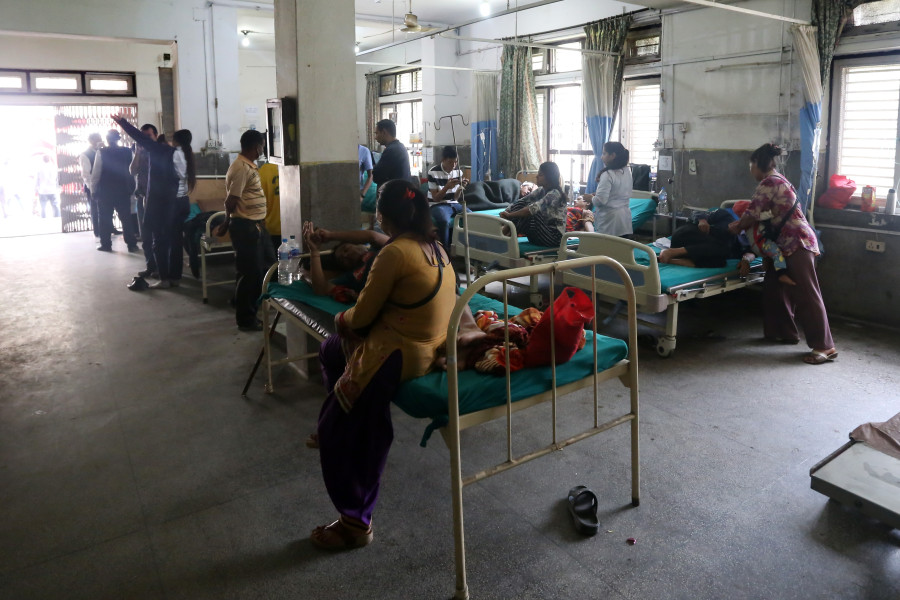Editorial
The Health Ministry has failed at controlling the dengue outbreak
Tragic stories of clearly avoidable deaths due to dengue fever reflects the dysfunction of our health care system.
The first case of dengue fever this year was reported in May. The caseload has been increasing steadily ever since, and now four months later, dengue fever has become an epidemic claiming six lives and as many as 8,000 people across 56 districts have been hospitalised. The situation is deteriorating and could very well be described as a health emergency. But the authorities do not feel the same way. Yet.
With people thronging Shukraraj Tropical Hospital in Teku fearing that they might have contracted dengue fever, officials are scrambling to contain the disease. A viral disease transmitted by the bite of the Aedes aegypti and Aedes albopictus mosquitoes, dengue is not deadly if detected early and treated on time. But tragic stories of clearly avoidable deaths gave the crisis a human face reflecting the dysfunction of our health care system. Low public health spending, non-availability of beds and shortages of human resources have perennially hamstrung our health care system. Regrettably, this neglect has taken its toll.
Since the dengue outbreak, an unprecedented number of patients have been forced to wait on the hospital premises, corridors and outside. What’s more, two to three patients have had to squeeze into one bed.
The sharp spike in the number of dengue cases is a result of neglecting to implement critical interventions in a timely manner. As there is no prescribed medicine to cure dengue, controlling it requires strong community outreach through the primary healthcare system. Meaning, irrespective of the political leadership, health workers would have visited different areas and educated people on the risks of dengue outbreaks, identified potential mosquito breeding grounds, and worked with households and communities to ensure implementation of public health measures to prevent the Aedes mosquito from establishing itself. Since the Aedes mosquito cannot travel beyond 100 metres, the involvement of people and households is a must.
All three tiers of government—local, provincial and federal—are ill-prepared and lack coordination. Had there been proper communication and coordination between the governments, it would have been not so difficult to take the above-prescribed steps. But the problem lies mainly in the attitude. The Health Ministry has not taken any steps to contain the disease while the minister concerned, Upendra Yadav, has been out of the country during such a critical time. His going out of the country and his ministry's failure to declare a health emergency reveals where the priorities of the government lie.
Had the authorities concerned run an awareness campaign and a mosquito search and destroy drive before the pre-monsoon season, the epidemic could have been averted too. Since health emergency can strike anytime, preparedness is key. What's more, since public health education is largely the responsibility of the governmental public health system, the obvious conclusion of a preventable disease such as dengue claiming lives and hospitalising scores of people is that health care workers, as well as health departments, are not really tuned very finely to meet this need.
***
What do you think?
Dear reader, we’d like to hear from you. We regularly publish letters to the editor on contemporary issues or direct responses to something the Post has recently published. Please send your letters to [email protected] with "Letter to the Editor" in the subject line. Please include your name, location, and a contact address so one of our editors can reach out to you.




 14.24°C Kathmandu
14.24°C Kathmandu














